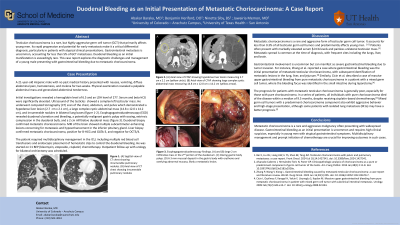Monday Poster Session
Category: GI Bleeding
P2542 - Duodenal Bleeding as an Initial Presentation of Metastatic Choriocarcinoma: A Case Report
Monday, October 28, 2024
10:30 AM - 4:00 PM ET
Location: Exhibit Hall E

Has Audio
- AB
Abakar Baraka, MD
University of Colorado-Anschutz Campus
San Antonio, TX
Presenting Author(s)
Abakar Baraka, MD1, Benjamin Heriford, DO2, Jawairia Memon, MD3, Ninette Siby, BS4
1University of Colorado-Anschutz Campus, San Antonio, TX; 2UTHSCSA, San Antonio, TX; 3University of Texas Health Science Center, San Antonio, TX; 4University of Texas Health San Antonio, San Antonio, TX
Introduction: Testicular choriocarcinoma is a rare, but highly aggressive germ cell tumor (GCT) that primarily affects young men. Its rapid progression and potential for early metastasis make it a critical differential diagnosis, particularly in patients with atypical clinical presentations. Gastrointestinal metastasis is uncommon, accounting for less than 5% of GCT metastases. Duodenal bleeding as an initial manifestation is exceedingly rare. This case report explores the diagnostic challenges and management of a young male presenting with gastrointestinal bleeding due to metastatic choriocarcinoma.
Case Description/Methods: A 21-year-old Hispanic male with no past medical history presented with nausea, vomiting, diffuse abdominal pain, hematemesis, and melena for two weeks. Physical examination revealed a palpable abdominal mass and generalized abdominal tenderness.
Initial investigations revealed a hemoglobin level of 6.5 and an LDH level of 277. Imaging showed a complex left testicular mass, a hypodense liver lesion (1.5 cm x 1.4 cm), innumerable nodules in bilateral lung bases, and a large complex cystic abdominal mass (14.8 x 12.0 x 14.2 cm). Serum AFP was 13.2. Esophagogastroduodenoscopy (EGD) revealed duodenal ulceration and bleeding, a potentially malignant gastric polyp with oozing, extrinsic compression in the duodenal bulb, and a 2 cm infiltrative duodenal mass. Duodenal biopsy confirmed metastatic choriocarcinoma. MRI of the brain showed multiple subcentimeter-enhancing lesions concerning for metastasis and hypoenhancement in the inferior pituitary gland. Blood tests revealed elevated AFP and beta hCG. Liver biopsy confirmed metastatic choriocarcinoma, positive for B-HCG and GATA-3, and negative for OCT3/4.
The patient required multidisciplinary management in the ICU, including multiple red blood cell transfusions and endoscopic placement of hemostatic clips to control the duodenal bleeding. He was started on C1 BEP (bleomycin, etoposide, cisplatin) chemotherapy. Outpatient follow-up with urology for bilateral orchiectomy was scheduled.
Discussion: Metastatic choriocarcinoma is a rare and aggressive malignancy often presenting with widespread disease. Gastrointestinal bleeding as an initial presentation is uncommon and requires high clinical suspicion, especially in young men with atypical gastrointestinal symptoms. Multidisciplinary management and prompt initiation of chemotherapy are crucial for improving outcomes in such cases.
Disclosures:
Abakar Baraka, MD1, Benjamin Heriford, DO2, Jawairia Memon, MD3, Ninette Siby, BS4. P2542 - Duodenal Bleeding as an Initial Presentation of Metastatic Choriocarcinoma: A Case Report, ACG 2024 Annual Scientific Meeting Abstracts. Philadelphia, PA: American College of Gastroenterology.
1University of Colorado-Anschutz Campus, San Antonio, TX; 2UTHSCSA, San Antonio, TX; 3University of Texas Health Science Center, San Antonio, TX; 4University of Texas Health San Antonio, San Antonio, TX
Introduction: Testicular choriocarcinoma is a rare, but highly aggressive germ cell tumor (GCT) that primarily affects young men. Its rapid progression and potential for early metastasis make it a critical differential diagnosis, particularly in patients with atypical clinical presentations. Gastrointestinal metastasis is uncommon, accounting for less than 5% of GCT metastases. Duodenal bleeding as an initial manifestation is exceedingly rare. This case report explores the diagnostic challenges and management of a young male presenting with gastrointestinal bleeding due to metastatic choriocarcinoma.
Case Description/Methods: A 21-year-old Hispanic male with no past medical history presented with nausea, vomiting, diffuse abdominal pain, hematemesis, and melena for two weeks. Physical examination revealed a palpable abdominal mass and generalized abdominal tenderness.
Initial investigations revealed a hemoglobin level of 6.5 and an LDH level of 277. Imaging showed a complex left testicular mass, a hypodense liver lesion (1.5 cm x 1.4 cm), innumerable nodules in bilateral lung bases, and a large complex cystic abdominal mass (14.8 x 12.0 x 14.2 cm). Serum AFP was 13.2. Esophagogastroduodenoscopy (EGD) revealed duodenal ulceration and bleeding, a potentially malignant gastric polyp with oozing, extrinsic compression in the duodenal bulb, and a 2 cm infiltrative duodenal mass. Duodenal biopsy confirmed metastatic choriocarcinoma. MRI of the brain showed multiple subcentimeter-enhancing lesions concerning for metastasis and hypoenhancement in the inferior pituitary gland. Blood tests revealed elevated AFP and beta hCG. Liver biopsy confirmed metastatic choriocarcinoma, positive for B-HCG and GATA-3, and negative for OCT3/4.
The patient required multidisciplinary management in the ICU, including multiple red blood cell transfusions and endoscopic placement of hemostatic clips to control the duodenal bleeding. He was started on C1 BEP (bleomycin, etoposide, cisplatin) chemotherapy. Outpatient follow-up with urology for bilateral orchiectomy was scheduled.
Discussion: Metastatic choriocarcinoma is a rare and aggressive malignancy often presenting with widespread disease. Gastrointestinal bleeding as an initial presentation is uncommon and requires high clinical suspicion, especially in young men with atypical gastrointestinal symptoms. Multidisciplinary management and prompt initiation of chemotherapy are crucial for improving outcomes in such cases.
Disclosures:
Abakar Baraka indicated no relevant financial relationships.
Benjamin Heriford indicated no relevant financial relationships.
Jawairia Memon indicated no relevant financial relationships.
Ninette Siby indicated no relevant financial relationships.
Abakar Baraka, MD1, Benjamin Heriford, DO2, Jawairia Memon, MD3, Ninette Siby, BS4. P2542 - Duodenal Bleeding as an Initial Presentation of Metastatic Choriocarcinoma: A Case Report, ACG 2024 Annual Scientific Meeting Abstracts. Philadelphia, PA: American College of Gastroenterology.
